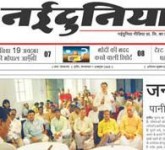NaiDunia comes to Delhi

The
The media group NaiDunia also launched a weekly newspaper and a magazine from nine state capitals - Chandigarh, Dehradun, Jaipur, Lucknow, Patna, Bhopal, Ranchi, Mumbai and Raipur. Chief Editor Alok Mehta¿s announcement that NaiDunia was appointing a former Chief Justice as Ombudsman for the group of publications was met with a round of applause.
The NaiDuinia group which professes journalism with a difference hosted a novel function where it was prominent personalities from the world of art, literature, social work and sports who adorned the dais. Senior political figures like former prime minister IK Gujral, Home Minister Shivraj Patil, Human Resource Minister Arjun Singh, BJP President Rajnath Singh, Samajwadi party chief Mulayman Singh Yadav, and Janata Dal chief Sharad Yadav occupied the front rows in the audience. The chief guests included eminent writers and poets such as Gulzar, Javed Akhtar and Rajendra Yadav, singer Shubha Mudgal, Delhi¿s medal winning Olympian Sushil Kumar, Magsaysay award winning social activists Aruna Roy and Sandeep Pandey and well known artist from Bihar, Subodh Gupta. The chief guests were all newspaper readers who utilised the occasion to hold a mirror to the assembled media personalities, giving a powerful and eloquent view of their perceptions of the state of the media in the present time.
Popular poet, Javed Akhtar said a change had taken place within journalism in the recent years. Indian cinema is called escapist, but it was a form of entertainment like a circus, while art was about realism, he said. Instead of cinema learning from the media to be more realistic, it was unfortunate that the media was learning from cinema. Media had become pure entertainment, the poet said; it was no longer fulfilling its responsibility of providing news. Health and education were the most important issues that touched the lives of the people but these issues rarely featured on the front pages of newspapers while TV channels ignored such subjects.
Aruna Roy focused on democracy and the importance of the media as the fourth estate in a democratic structure. According to the well-known social activist, the cornerstone of democracy was having the freedom to make informed choices. The media was the means to make the democratic structure stronger by providing accurate, unbiased information to people to allow them to make well informed choices. "But what we have today is what the media gives us - a lot of news and information which we did not want to know at all," she said.
According to Gulzar, the newspapers these days were focused on trivia rather than important news. Just like the fresh vegetables available every day, the daily newspapers would bring "taaza khabar" (fresh news) marketing it like "tarkari" (vegetables) in the market. He recited a couplet that said that people were more bothered about why the newspaper was wet when it arrived in the morning rather than the fact that 500 villages had got washed away by the floods. There were news and events but no thoughts in the newspapers. He recited a poem that referred to the kind of news that appeared in the media, ending with the words that "khoon se latpat akhbar mere ghar ata hai". (every morning the newspaper arrives at my home soaked in blood.)
Eminent writer and editor of Hans magazine, Rajendra Yadav took a dig at the daily newspapers with the remark that every newspaper was aligned with one politician or the other. The newspapers are usually full of statements of political leaders (netaon ke bayan).There was little news of value in the publications, for the papers only printed views. He added that there was a time when newspapers were known by the names of their editors but now they were known as the owner¿s papers.
There were a few home truths for the media for its tendency to label young men as terrorists even before they had been interrogated by the police. Activist Sandeep Panday chastised the media for branding as a terrorist every young person who was taken into custody on suspicion of involvement in terrorist activities. One of the alleged terrorists killed in the Batla House encounter was 17 years old. He said that he had gone to Uttar Pradesh where he had met the family of the 17-year old who had left home for the first time just three months ago. Why did the media not raise questions on how a teenager could get so radicalised in less than three months as to take part in a terrorist operation, he asked.
Artist Subodh Gupta spoke about the growing intolerance in evidence in society. Referring to MF Hussian without naming him, said that the country¿s most senior artist was living abroad in exile because of this intolerance. Shubha Mudgal expressed satisfaction at the cover of Sunday NaiDunia which carried pictures of performing artistes. Referring to the practice of ¿paid news¿ where people pay money for being written about, she said that in these days of paid news, it was good to see a publication giving prominence to creative people.
People in the audience nodded in approval of several hard-hitting points made by the speakers. The kind of applause that each speaker received was ample indication that the audience agreed with the chief guests¿ views on the media in the country. The 61-year old newspaper, NaiDunia truely marked its arrival in






